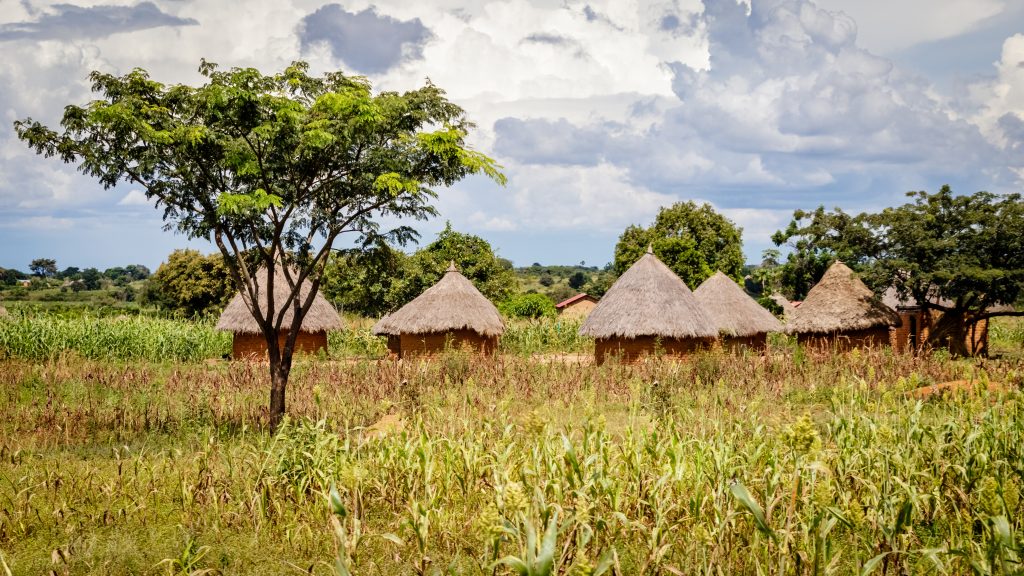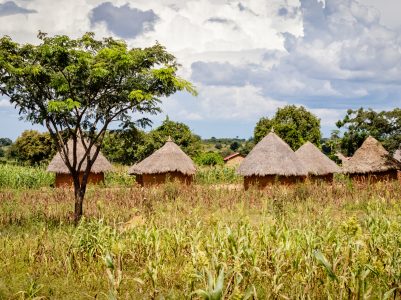By Dr. James Christie, Ambassador-at-Large, Canadian Multifaith Federation
Rakai sits on the border of Uganda and Tanzania, just below the equator. It isn’t really a town. It’s not even a village, nor yet a hamlet. It is a cluster of low buildings straddling the crossing. The dividing line is a much-guarded horizontal pole stretching across the road. The pole is raised and lowered by hand as the mostly truck traffic is permitted to cross from one country to the other. It is a slow process. Truck drivers might wait in line for days: tired, hot, bored. Local girls, including wives and young mothers, ease the boredom in exchange for desperately needed cash. Their husbands work for months on end as far away as South Africa. The girls have to survive.
It will come as no surprise that Rakai, during the late 1990’s, became the entry point for HIV/AIDS into Uganda. It came in trucks. Death rode in the passenger seat. And Death made itself at home, as it did throughout all of sub-Saharan Africa. HIV/AIDS and its partner, Death in a particularly pestilent form, changed the nature of life across the continent.
Zoe and Jeremiah, two long-ago and briefly cherished friends, are but two of thousands of stories from that pandemic.

A Peek into the Pandemic
Zoe lived (and I hope, but doubt, lives still) on the Ugandan side of the line. Twenty years ago, you might have found Zoe by heading north from Tanzania, through the Rakai border crossing, and then hanging a sharp right onto what was more a track than a road, and continuing to climb through the dense bush.
After what feels a subjective eternity, but is only a matter of miles, the bush opens up on a shambwa, an inhabited clearing. This shambwa is home to several traditional dwellings of sun-dried mud brick and thatch. We see first a cheery outdoor space that can only be a classroom, shaded by tall trees. The space is thronged by children: lots of children, from toddlers to young adults.
A short few meters away is an open-air brick factory with several young men working with breath-taking speed molding the sun-dried bricks. A small stand of maize towers above a modest subsistence and market garden patch.
Beside the farthest hut are eight low earthen mounds in two rows of four.
As our handful of Canadian church leaders clamber stiffly from our people-mover, a tiny figure steps through the gaggle of happy children to welcome us with grace and dignity. She might be any age we might define as old. She was expecting us. We had come, she knew, to learn more of the experience of ‘slim,’ the wasting disease which was HIV/AIDS. We were about to learn a lot.
Mentor, Matriarch, and Midwife
The woman’s name was Zoe. She thought she was nearly 60. She was pleasant looking, clearly good-natured, and unmistakably the matriarch of her little world. Not all was well with her. From her left jaw to the intersection of her neck and shoulder was an enormous swelling, tumor-like. The growth inhibited her speech and evidently her capacity to swallow; even to some extent, to breathe. As we began to talk with her, our translator was taxed—very. So much to ask. So much to learn. And Zoe was happy to share, despite her obvious and extreme discomfort. The 19 children were her grandchildren. She was proud that her brickworks and market garden provided income enough to care for the children and purchase the required uniforms so that they might attend school. At her sign, the children formed an impromptu choir and sang for the Wazungu, for us. The angelic voices followed us as Zoe led us around her shambwa. She explained the brick-making business. She detailed the allocations of each residential hut.
Then she explained the low mounds. They were graves. Eight of them. Four for her sons; four for her daughters-in-law; all taken by HIV/AIDS. So now her grandchildren were her children. That was life. And death.
One hut was set farther apart from the rest. In its dark coolness, on a packed floor of dirt and rushes, sat a very young woman. She was nursing her newborn. Zoe had delivered the little fellow at dawn, after his mother had walked by moonlight, all night, to reach Zoe. Beyond all her other vocations, Zoe was also the local midwife. It was the closest to Bethlehem we will ever come.
As to the growth on her neck, well, who knew? Once a week her eldest granddaughter walked five miles to the nearest town to purchase potatoes, which, when mashed, were Zoe’s dietary staple.
A Prayer
Too soon, it was time for farewells. One of our number asked through the interpreter if we might pray for her. Ever the particularist, I requested our translator to ask Zoe what she would like us to pray for.
Zoe didn’t hesitate. She wished us to pray for three things. First, that her children might grow up to be good citizens. Second, that she might live long enough to see them grow up. Third, she had heard that people in Northwestern Uganda were suffering at the hands of the Lord’s Resistance Army. She wanted us to pray for them, and for peace.
A Question
Then due south, to the tip of Lake Victoria, the once near-mythical source of the Nile. We made our base in lodgings in the Port of Bukobe. From there, it was back into the bush. We visited outlying settlements and child-led households, all the adults having been wiped out by the pandemic. We should, perhaps, have been horrified. Rather, we were humbled by hope and by the spirit which infused all those we met. We listened, we learned. Our group occupied two Toyota Land Cruisers as we bounced over the bright red dirt roads across the Veldt and in and out of the dense bush. At the end of one very long day, on the drive westward back to Bukobe, I had the passenger seat beside our driver, a man younger than I, but not by too much. In the vivid African sunset, rapid as always near the equator, we talked through nightfall. Jeremiah and I talked of everything: our childhood, our homes, our families, our own children. We did not speak of the crisis born of the pandemic. Not directly.
But as the lights of Bukobe twinkled like low-hanging stars over the inland sea, Jeremiah turned to me.
“Jacobo,” he asked wistfully, “Why are you Europeans so lucky, and we Africans so unlucky?”
Silence. Long silence.
Finally, at length, “Jeremiah, I don’t know. But as we go forward into the future, there must be no question of luck. We Europeans must learn that we are all one people. One family. We must embrace one future – or there will be no future.”
Poor comfort that. But still I believe it.
More than Education
As the smug, disastrously imperial nineteenth century drew to a close, H.G. Wells observed that the human community was in a desperate race between education and catastrophe. He was correct: as far as it goes. But it cannot be denied that the most deadly and dangerous era in human history emerged from the most educated period in history: expressed in war, genocide, nuclear holocaust, and climate change.
Education is not enough. A century later, Jeremy Rifkin published his magisterial The Empathic Civilization. His central thesis eerily mirrored Wells. It might be summarized as the conviction that humanity is in a desperate race between empathy and catastrophe.
Empathy conjoined with education is the formula.
True Empathy
Make no mistake: empathy is not pity nor sympathy. It is the capacity to truly relate to our neighbor – indeed the whole of creation. It is to feel for everyone that gut-twisting, soul-wrenching pain that issues in action.
That empathy rests on the compassion of the Buddha and the Christ, among others. It acknowledges the almost unbearable burden of being truly human.
Empathy and education conjoined are the urgent agenda of the IF20 in its ongoing engagement with the G20. They are embodied in Zoe’s prayer; they are the answer to Jeremiah’s question.
– – –
Dr. James Christie is the inaugural Ambassador-at-Large for the Canadian Multifaith Federation and part of the G20 Interfaith Forum Board of Directors. For 15 years, Christie served at the University of Winnipeg as Dean of Theology, Dean of the Global College, and Director of the Ridd Institute for Religion and Global Policy.


